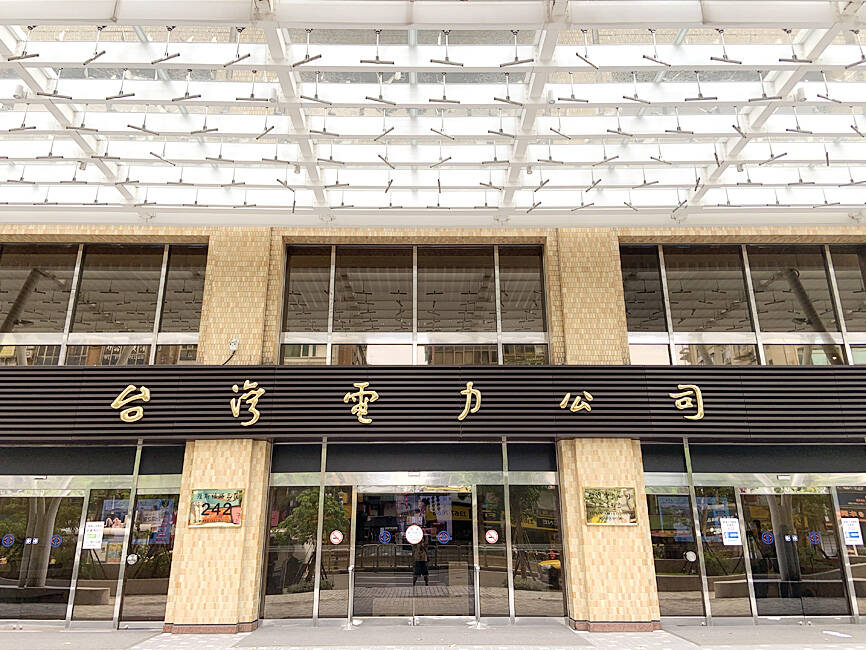State-owned utility Taiwan Power Co (Taipower, 台電) has made its last payment for Russian coal under a deal signed before the war in Ukraine and would not enter into any new purchase agreements with Russia, a company spokesperson said yesterday.
Taiwan has joined in Western-led sanctions against Russia for its invasion of Ukraine, keen to show it is a responsible member of the international community, and the government has condemned Russia for its actions.
Taipower spokesperson Wu Chin-chung (吳進忠) said that before the war the company had agreed to buy 1.16 million tonnes of coal this year from Russia for US$280 million.

Photo: Tu Chien-jung, Taipei Times
The final payment of US$150 million was made this month and no further coal would be bought from Russia, with coal coming instead from Indonesia, Australia, Colombia and South Africa, Wu said.
Most coals procured by Taipower are from Indonesia and Australia and a few of coals are from Russia, the company’s Web site showed.
The coals from Australia and Russia are bituminous coals that can provide higher heating value, while those from Indonesia are sub-bituminous coals with extremely low ash content, the Web site showed.
Wu’s remark came after a Finnish think tank said that Japan, South Korea and Taiwan imported US$5.5 billion of fossil fuels from Russia in the first five months of this year following the war in Ukraine.
The Helsinki-based Center for Energy and Clear Air Research estimated that Japan purchased US$2.6 billion of Russian coal, oil and gas between Feb. 24 and July 31, while South Korea purchased US$1.7 billion of Russian fuels during this period and Taiwan US$1.2 billion, Nikkei Asia reported on Tuesday.
China imported about US$28 billion of Russian energy over the period, making it the world’s largest buyer, the report said, citing the center’s estimate.
Additional reporting by Chen Cheng-hui

In Italy’s storied gold-making hubs, jewelers are reworking their designs to trim gold content as they race to blunt the effect of record prices and appeal to shoppers watching their budgets. Gold prices hit a record high on Thursday, surging near US$5,600 an ounce, more than double a year ago as geopolitical concerns and jitters over trade pushed investors toward the safe-haven asset. The rally is putting undue pressure on small artisans as they face mounting demands from customers, including international brands, to produce cheaper items, from signature pieces to wedding rings, according to interviews with four independent jewelers in Italy’s main

Macronix International Co (旺宏), the world’s biggest NOR flash memory supplier, yesterday said it would spend NT$22 billion (US$699.1 million) on capacity expansion this year to increase its production of mid-to-low-density memory chips as the world’s major memorychip suppliers are phasing out the market. The company said its planned capital expenditures are about 11 times higher than the NT$1.8 billion it spent on new facilities and equipment last year. A majority of this year’s outlay would be allocated to step up capacity of multi-level cell (MLC) NAND flash memory chips, which are used in embedded multimedia cards (eMMC), a managed

In the wake of strong global demand for AI applications, Taiwan’s export-oriented economy accelerated with the composite index of economic indicators flashing the first “red” light in December for one year, indicating the economy is in booming mode, the National Development Council (NDC) said yesterday. Moreover, the index of leading indicators, which gauges the potential state of the economy over the next six months, also moved higher in December amid growing optimism over the outlook, the NDC said. In December, the index of economic indicators rose one point from a month earlier to 38, at the lower end of the “red” light.

The global server market is expected to grow 12.8 percent annually this year, with artificial intelligence (AI) servers projected to account for 16.5 percent, driven by continued investment in AI infrastructure by major cloud service providers (CSPs), market researcher TrendForce Corp (集邦科技) said yesterday. Global AI server shipments this year are expected to increase 28 percent year-on-year to more than 2.7 million units, driven by sustained demand from CSPs and government sovereign cloud projects, TrendForce analyst Frank Kung (龔明德) told the Taipei Times. Demand for GPU-based AI servers, including Nvidia Corp’s GB and Vera Rubin rack systems, is expected to remain high,